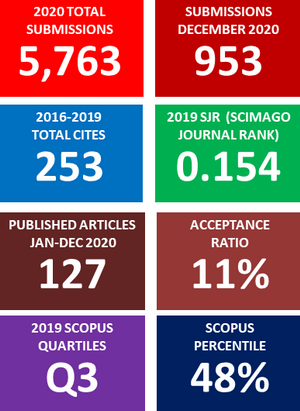Quality of Life of the Royal Thai Navy College of Nursing’s Personnel
DOI:
https://doi.org/10.48048/wjst.2019.3897Keywords:
Quality of life, Royal Thai NavyAbstract
This was a descriptive research aiming at investigating the quality of life of the Royal Thai Navy College of Nursing’s (RTNCN) personnel. There were 325 samples which were from the executives, nursing instructors, supporting staff and nursing students in the academic year 2014. The research tool was the World Health Organization Quality of Life assessment (WHOQOL - BRIEF - THAI) and the reliability of which was tested using the Cronbach’s Alpha with the result at 0.91. The statistics applied in this study were descriptive statistic. The results were as follows: 1) The Quality of Life in the aspects of physical health, psychological state, environment and overview of Quality of Life were mainly at moderate level (66.77, 54.77, 45.54, 75.38 and 57.85 percent respectively); and 2) Analyzing the Mean, it was found that QOL in all aspects of the personnel was at moderate level.Downloads
Metrics
References
National Economic and Social Development Board Office of the Prime Minister. The Eleventh National Economic and Social Development Plan (2012 - 2016), Available at: http://www.nesdb.go.th/nesdb_en/ewt_dl_link.php?nid=3786, accessed January 2014.
The WHOQOL Group. The World Health Organization Quality of Life Assessment (WHOQOL): Development and general psychometric properties. Soc. Sci. Med. 1998; 46, 1569-85.
S Mahatnirunkul, W Tuntipivatanakul and W Pumpisanchai. Comparison of the WHOQOL-100 and the WHOQOL-BREF (26 items). J. Ment. Health Thai 1998; 5, 4-15.
V Chinvechkijvanich, N Huannaklang and O Songrum. The Quality of Life of Chulalongkorn University Survey Project, Available at: http://www.surveillance.cphs.chula.ac.th/attachments/ article/121/Quality of life 2551.pdf, accessed January 2014.
S Serirat, S Hirunkitti, S Suwannapirom, C Prapawanon and S Vanichayaporn. Organization and Management. Thammasan, Bangkok, 2002.
V Choeisuwan, R Changsila, R Sujijantorarat and W Boonrod. Factors related to retention of nursing educators, The Royal Thai Navy College of Nursing. J. Royal Thai Army Nurs. 2013; 14, 51-60.
T Yaemsuda, K Sathuwong, S Siriwong and W Lumwanna. Happiness and satisfaction of Naval Medical’s personnel. Royal Thai Air Force Med. Gaz. 1996; 59, 14-21.
SK Kangawan. Personality Psychology Theory. 4th ed. Ruenkaew Printing, Bangkok, 2006.
Downloads
Published
How to Cite
Issue
Section
License
Copyright (c) 2018 Walailak Journal of Science and Technology (WJST)

This work is licensed under a Creative Commons Attribution-NonCommercial-NoDerivatives 4.0 International License.













